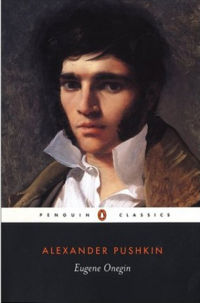
Pushkin pioneered the use of vernacular speech in his poems, creating a style of storytelling-mixing drama, romance, and satire-associated ever with greatly influential later literature. People consider this author the greatest poet and the founder of modern literature. Works of Russian writer Aleksandr Sergeyevich Pushkin include the verse novel Eugene Onegin (1831), the play Boris Godunov (1831), and many narrative and lyrical poems and short stories.

Nabokov's commentary consists of line-by-line notes on Pushkin's poem. A huge work of scholarship, this enormous book illuminates Pushkin's great verse novel in obsessive detail & describes early 19th century Russia.

Nabokov notes how translating rhymed poetry into unrhymed prose robs a poem of its 'bloom'. The introduction examines several ways of reading the novel, and the text is richly annotated. This new translation seeks to retain both the literal sense and the poetic music of the original, & capture the poem's spontaneity & wit. Eugene Onegin was Pushkin's own favourite work, and it shows him attempting to transform himself from romantic poet into realistic novelist.

Engaging, full of suspense, and varied in tone, it also portrays a large cast of other characters & offers the reader many literary, philosophical, and autobiographical digressions, often in a highly satirical vein. Set in imperial Russia during the 1820s, Pushkin's novel in verse follows the emotions and destiny of three men - Onegin the bored fop, Lensky the minor elegiast,& a stylized Pushkin himself - and the fates and affections of three women - Tatyana the provincial beauty, her sister Olga, & Pushkin's mercurial Muse. Eugene Onegin is the master work of the poet whom Russians regard as the fountainhead of their literature. Influeneced by Byron, Pushkin reveals the nature of his heroes through the emotional colorations found in their witty remarks, nature descriptions, and unexpected actions, all conveyed in stanzas of sonnet length (a form which became known as the Onegin Stanza), faithfully reproduced by Walter Arndt inthis Bollingen Prize translation. By turns brilliant, entertaining, romantic and serious, it traces the development of a young Petersburg dandy as he deals with life and love.

Pushkin's "novel in verse" has influenced Russian prose as well as poetry for more than a century. This is the widely acclaimed translation of Russian literature's most seminal work.


 0 kommentar(er)
0 kommentar(er)
